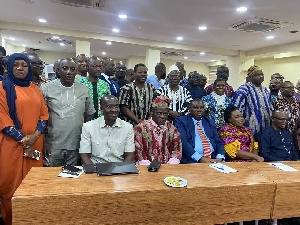- Home - News
- Elections 2024
- News Archive
- Crime & Punishment
- Politics
- Regional
- Editorial
- Health
- Ghanaians Abroad
- Tabloid
- Africa
- Religion
- Photo Archives
- Press Release
General News of Thursday, 10 April 2025
Source: www.ghanawebbers.com
Local Gov't Minister calls for data-driven reforms and digital innovation at Births and Deaths Registry
The Minister for Local Government, Chieftaincy and Religious Affairs, Ahmed Ibrahim, spoke at a retreat in Accra. He emphasized the need for digital transformation and investment in Ghana’s civil registration systems. This event focused on reviewing the Births and Deaths Registry's performance for the first quarter of 2025.
In 2024, the Registry recorded 663,226 births and 53,671 deaths. This represents coverage of 91% for births and 39% for deaths. While progress is notable, there are significant gaps in death registration that need urgent attention.
The Minister reaffirmed Ghana’s commitment to international frameworks like SDG 16.9. This goal aims for legal identity for all by 2030. He also mentioned the African Union’s Agenda 2063 as vital for inclusive development.
As the Births and Deaths Registry celebrates its 60th anniversary, the Minister praised its role in national development. He called for efforts to address infrastructure issues and modernize operations. The Ministry aims to achieve universal coverage by eliminating registration bottlenecks.
Several initiatives were outlined to strengthen the Registry's capacity under President John Dramani Mahama's government:
- Completing a restructured Scheme of Service for human resource development.
- Equipping over 2,000 registration officers across various assemblies.
- Establishing new regional offices and refurbishing old facilities.
- Procuring 2,000 tablets for real-time registration.
- Constructing a permanent National Office for the Registry.
- Increasing vehicles and motorbikes to reach remote areas.
The Minister praised the Harmonized Births and Deaths Registration Portal but stressed further integration with national institutions. He highlighted the need for interoperability between key services like Ghana Health Service and National Identification Authority.
Decentralization was emphasized as an ongoing process that must adapt to national needs. The integration of district-level staff into local governance is a positive step forward. However, more work is needed to ensure accurate data collection at community levels.
In conclusion, he urged stakeholders to use this retreat as a chance to adopt innovative strategies. “This retreat is not just a review—it is a call to action,” he said. He encouraged everyone to ensure every birth and death in Ghana is recorded accurately and respectfully. Together, we can build a more inclusive and efficient Ghana driven by data.











